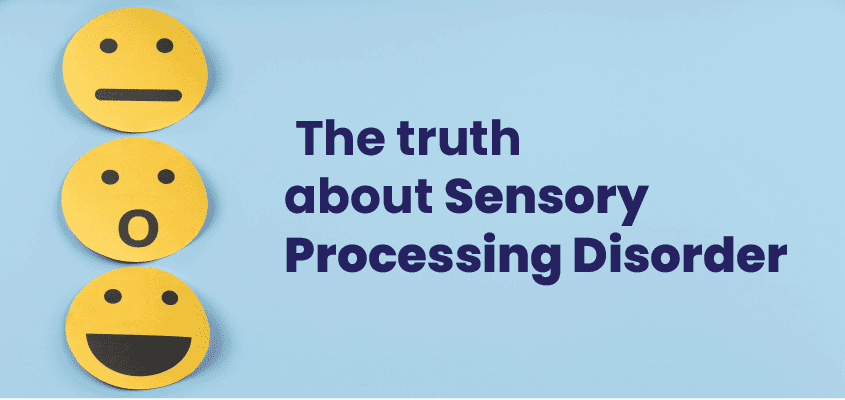Introduction
People with sensory processing disorder may be oversensitive and undersensitive to stimuli such as noise, light and touch. It can make everyday activities and tasks difficult to manage.This blog post features everything you need to know about sensory processing disorder, including its symptoms, causes, types and how to manage it effectively.
Read on to learn more.
What is sensory processing disorder?
Sensory processing disorder is a neurological condition affecting how the nervous system processes and responds to sensory information. People with sensory processing disease can be over-sensitive or undersensitive to certain things. It causes reactions to feeling overwhelmed or understimulated [1].Furthermore, this condition can impact any of the senses but is most commonly associated with the purpose of touch. People with sensory processing disorder may have difficulty tolerating certain textures, fabrics, or temperatures and may also be susceptible to touch, light, sound or smell.This disorder can also make it difficult to process and interpret information from the vestibular system, which is responsible for our sense of movement and balance. Those with vestibular processing disorder may have difficulty standing still or moving around without losing balance and feel nauseous while moving [2].
Sensory processing disorder can cause a variety of symptoms, including:
- Difficulty regulating arousal levels
- Poor sleep quality
- Difficulty with concentration and attention
- Impulsivity
- Hyperactivity
- Anger
Types of sensory processing disorder
There are three main types of sensory processing disorders:
-
Sensory modulation disorder
It is when the brain has trouble regulating responses to different stimuli. For example, a person with this sensory processing disorder may be oversensitive to loud noises or touch and have difficulty coping with environmental changes [3]. There is three subtypes division of Sensory modulation disorder:
-
Over-responsivity: Exaggerated and longer behavioral response to ordinary stimuli.
-
Sensory under-responsivity: Lack of adequate responsiveness or under-responsiveness to ordinary positive stimuli.
-
Sensory craving: Seeking additional sensory input or showing sensory offensiveness.
-
Sensory-based motor disorder
It is when the brain has trouble planning and executing movements. A person with this sensory processing disorder may struggle with coordination and balance. The sensory-based motor disorder is also further categorized into two subtypes:
-
Dyspraxia: A neuro-developmental condition in children wherein they have difficulty performing coordinated movements.
-
Postural disorder: Postural disorder is due to prolonged poor body posture resulting in aches in the neck, hips, head, lower back, shoulders, etc.
-
Sensory discrimination disorder
It happens when the person is unable to differentiate between two similar sensations. People with this kind of sensory processing disorder require extra time to process sensory information as their capacity to perceive sensory information is significantly reduced compared to others.Children and adults can have one of the following types of sensory processing disorders, or they may have more than one type of sensory processing disorder.
Causes of sensory processing disorder
There are many probable causes of sensory processing disorder, but the exact cause is unknown [4]. However, some risk factors may increase the likelihood of developing sensory processing disorder. These include being born prematurely, having a low birth weight, being exposed to toxins in utero, and having a family history of sensory processing disorder or other similar conditions [5].
The top five causes of this disorder are:
- Genetic factors: Sensory processing disorder can be hereditary and passed down through generations.
- Environmental factors: Exposure to certain chemicals, toxins, or stress can trigger sensory processing disorder.
- Neurological damage can occur due to a traumatic brain injury, stroke, or other neurological disorder.
- Developmental delay commonly occurs in children with sensory processing disorder who have delayed development in one or more areas.
- Sensory overload is when the brain is bombarded with too much sensory input and can no longer process it effectively.
Challenges of living with a sensory processing disorder
People with sensory processing disorder can have trouble with any of the five senses: sight, sound, smell, taste, and touch. They may also have difficulty with proprioception (the sense of where our body is in space) and vestibular processing (the importance of movement and balance).Furthermore, people with this neurological condition often have difficulty filtering out background information and may be easily distracted. They may also need help with fine motor skills and may be clumsy.In addition, people with sensory processing disorder may appear to be in a world of their own and may have difficulty interacting with others. They may also need help following instructions or be easily overwhelmed by their environment.If someone we know may have a sensory processing disorder, it is essential to seek professional help. Occupational therapy and other interventions can successfully treat the sensory processing disorder.
Seeking help for sensory processing disorder
There is no one-size-fits-all approach to managing sensory processing disorder, but some strategies can help. These include creating a sensory-friendly environment, using calming techniques and implementing self-regulation techniques.Sensory processing disorder is a complex condition that can impact every aspect of a person’s life. It is essential to seek professional help to ensure all the symptoms are correctly diagnosed and treated.As a parent, if we think our child may have a sensory processing disorder, we must talk to a doctor or occupational therapist. A therapist can help us develop a plan to manage the condition and improve our child’s quality of life.
Conclusion
Sensory processing disorder can significantly impact a person’s quality of life. It can make everyday activities such as shopping or school difficult. It can also affect a person’s social skills and ability to learn.If you suspect your child has a sensory processing disorder or is at risk of developing this condition, speak to a healthcare professional. Many studies show that with early diagnosis and proper treatment, people with sensory processing disorder can lead entire and happy lives.
References
- Sensory processing disorder: Causes, symptoms, and treatment (no date) WebMD. WebMD. Available at: https://www.webmd.com/children/sensory-processing-disorder (Accessed: February 28, 2023).
- Shaziya Allarakha, M.D. (2021) What are the three patterns of sensory processing disorders?, MedicineNet. MedicineNet. Available https://www.medicinenet.com/the_3_patterns_of_sensory_processing_disorders/article.htm (Accessed: February 28, 2023).
- Sensory modulation disorder (SMD) and Pain: A new perspective, Frontiers in integrative neuroscience. U.S. National Library of Medicine. Available at: https://pubmed.ncbi.nlm.nih.gov/31379526/#:~:text=Sensory%20modulation%20disorder%20(SMD)%20affects,%2C%20unpleasant%2C%20or%20even%20painful. (Accessed: March 3, 2023).
- Sensory processing disorders: Definition, symptoms, and more (no date) Medical News Today. MediLexicon International. Available at: https://www.medicalnewstoday.com/articles/sensory-processing-disorder#:~:text=It%20is%20unclear%20what%20causes,or%20attention%20deficit%20hyperactivity%20disorder. (Accessed: March 3, 2023).
- Rodden, J. (2023) What is sensory processing disorder? ADDitude. ADDitude. Available at: https://www.additudemag.com/what-is-sensory-processing-disorder/ (Accessed: March 3, 2023).










